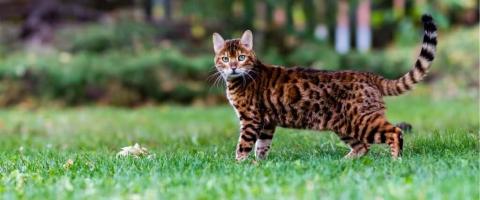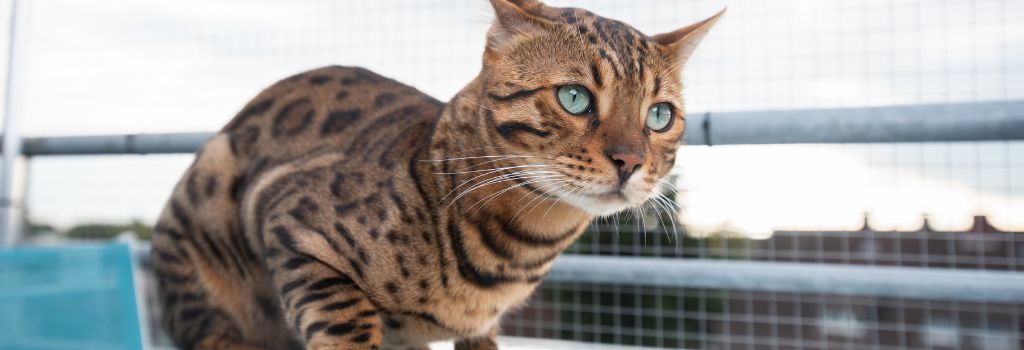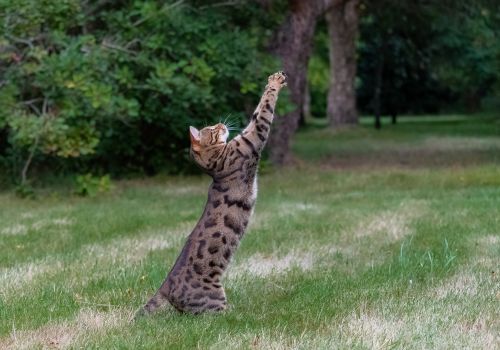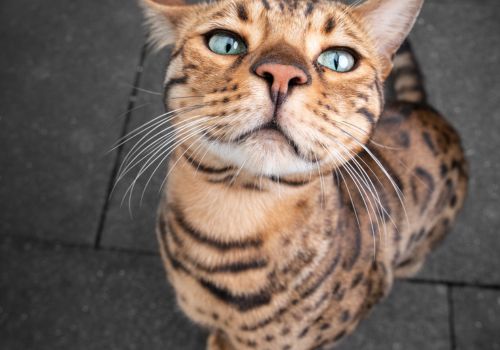
Oh, the Bengal cat! If you're a proud Bengal owner, you already know just how unique this breed is. Your feline companion doesn't just share your home; they understand your moods, investigate all your activities, and—let's be honest—runs your life with their adorable purrs and irresistible charisma. There's a good chance you picked a Bengal because you were drawn to some of their standout traits that just vibed with your lifestyle.
What Makes Bengals Unforgettable?
- Playfulness is Their Middle Name: Bengals don't just sit around; they want to engage with you. Expect lots of interactive play sessions and maybe even a game of fetch!
- Brainy Furballs: Ever tried teaching a cat tricks? Well, your Bengal is not only willing but highly capable. They're smart cookies, these ones.
- Curiosity Didn't Kill This Cat: A Bengal's alertness and curiosity are through the roof! Nothing happens in your home without them knowing about it.
- Sky's the Limit: High shelves, top of the fridge, you name it—Bengals love to be up high. It's like living with a very small, agile leopard.
- Social Butterflies: Bengals are not the aloof, staring-at-you-from-the-corner type of cats. They are outgoing and tend to be friendly, making them great companions.
- Cool Cats: Believe it or not, they usually get along well with other cat-friendly pets and children. They’re pretty laid-back when they want to be.
The Quirks You Should Know About:
- Chatterbox Alert: Your Bengal isn't shy about voicing her opinions—on everything. Yup, they are talks.
- Little Mischiefs: Left alone with no toys or attention? Your Bengal might redecorate your home in ways you didn't quite have in mind.
- Hunter Instinct: Watch out, squirrels (and occasionally, toes)! Bengals have a strong prey drive and love a good chase.
- Marking Territory: Breaking a Bengal's habit of territory marking can be a challenge, so patience is key.
- Pick Me Up? Maybe Not: Some Bengals are not fans of being picked up and carried around. They like their paws on the ground, thank you very much.
 So, Is it All Worth It?
So, Is it All Worth It?
Absolutely! Your Bengal's larger-than-life personality more than compensates for her little quirks. After all her adventures, climbs, and "conversations," they love nothing more than to curl up next to you for some well-earned rest. They're not just a pet; they're family.
A Brief History: How Did the Bengal Come to Be?
Curious about where this exotic-looking yet totally domestic diva came from? The Bengal breed is actually an American innovation. Imagine combining the wild, magnificent Asian Leopard cat with the down-to-earth, friendly American Shorthair. Voilà, you've got the Bengal—a cat that has the looks of a jungle feline but the temperament of your next-door tabby. But remember, early socialization is crucial with this breed, especially if you have other cats around. With their agile bodies and boundless energy, Bengals require both mental and physical stimulation. So, stock up on those toys and maybe even invest in a deluxe cat tree—they'll thank you in their own special way!
So, whether you're a veteran Bengal owner or considering adopting one, it's clear that life with a Bengal is anything but ordinary. And we wouldn't have it any other way.
Genetic Predispositions for Bengals
The Case of the Wandering Kneecap: Patellar Luxation
Is your Bengal a champion leaper and pouncer? That's all thanks to their stifle or knee joint. But sometimes, the kneecap decides to take a little detour, slipping to the side due to a poorly developed stifle. This condition is known as patellar luxation. Often, symptoms don't show until the condition has advanced, and it may result in lameness as your cat ages. Catching it early—perhaps during the initial spay or neuter appointment with a simple X-ray—can save you and your feline friend a lot of future distress. Depending on the severity, treatment can range from arthritis medication to surgery.
Hip Hip Hooray? Not Always: Hip Dysplasia
More commonly seen in dogs, hip dysplasia is also a Bengal problem. This genetic condition can cause malformed hip joints, leading to arthritis. While signs may be subtle at first, affected cats may begin to act like they’ve aged overnight, slowing down significantly. Diagnosing this early is crucial, so get that pelvic X-ray during your kitten’s spay or neuter appointment. Treatments can range from medication to surgical restructuring of the pelvis.

An Invisible Energy Crisis: Pyruvate Kinase Deficiency
Pyruvate Kinase Deficiency (PKD) is a silent crisis happening at the cellular level. This inherited disease diminishes an essential enzyme, leading to a form of anemia. While symptoms might not be obvious, a genetic test can identify if your Bengal is affected, a carrier, or non-carrier. Early detection is always better.
FIP: A Mysterious and Fatal Illness
Feline Infectious Peritonitis (FIP) is as ominous as it sounds. While all cats can carry the dormant virus, Bengals are more susceptible to the active, fatal form. Diagnosis is tricky, and once FIP takes hold in a community of cats, it's difficult to eliminate. Ask your breeder about any history of FIP before bringing your kitten home.
Knowing Your Cat’s Blood Type Can Save Lives
Just like humans, cats have different blood types. While most domestic cats are Type A, Bengals can be Type B or even AB. Knowing your cat’s blood type can be a lifesaver in emergencies requiring a blood transfusion. Consider adding this test to your cat’s routine wellness check.

A Tragic Start: Neonatal Isoerythrolysis (NI)
NI is a heart-wrenching immune reaction that occurs when a newborn kitten with one blood type nurses from a mother with a different blood type. The kitten’s own antibodies turn against its red blood cells, usually resulting in death shortly after birth. If you're thinking of breeding your Bengal, consult your vet about this risk.
Progressive Retinal Atrophy: Gradual Vision Loss
Progressive Retinal Atrophy (PRA) is a genetic condition causing vision loss and eventual blindness. Signs usually appear when your Bengal is around 18 months to 2 years old. Sadly, there is no treatment, but a genetic test can identify carriers among breeding cats.
If you have questions and you'd like to reach out to us, you can call us directly at (941) 253-5218, or you can email us at staff@uacvet.com. Don't forget to follow us on social media Facebook, Instagram.
